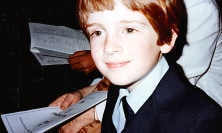The Perils of Forcefulness
Last Tuesday I reported for jury duty at the circuit court of Baltimore hoping that I’d get an early release. I had a lot going on at work, and I’ve heard the same horror stories as anyone else about the drudgery of jury duty. I won’t bore you with the bureaucratic process that led to my selection, but it felt a bit like Boba Fett sliding into the Sarlacc pit: tedious, inevitable and embarrassing.
The case was a murder trial, and for a variety of reasons, I don’t really want to talk about the specifics. Much of the prosecution’s evidence was circumstantial or from less-than-reliable sources, and the only defense mounted was the least believable alibi ever. This wasn’t the courtroom drama you expect from television and the movies: there was no stunning reversal, no teary testimony, and no conclusive evidence of guilt or innocence presented at the last moment by a plucky young attorney.
We found the defendant guilty on all counts including murder in the first degree.
I really hope that we were right to do so, because more than anyone else in the jury room, I feel like I was responsible for his conviction.
Don’t get me wrong: I believe that the defendant did the crime, and was responsible for his own actions. The prosecutor presented a credible case and the witnesses who testified presented the testimony that sealed his fate. I’m not suggesting that I sent this man to jail. The only part I played was in making my vote and deliberating with the other jurors.
But that’s not the whole truth.
I should point out that I feel like I did my job as a juror very well. I was on time to court, I paid careful attention at all times, and I took copious notes that included descriptions of testimony, details about witnesses, exhibits that were and were not entered into evidence, my own impressions, and questions that I had along the way. I can tell you everything from what’s depicted in State’s Exhibit 2F to what kind of shoes each witness and lawyer wore.
In addition, I made sure that I understood the court’s instructions about the specifics of each charge and the way that we were told to interpret the law. I did my best to keep track of what statements were stricken from the record and paid no attention to them.
And I worked very hard to have an open mind. I started the trial thinking of how young the defendant was and I not only considered him innocent until proven guilty, I wanted him to be innocent. I worried about how well a jury that was two-thirds white could understand a case where all the important participants were black. I was troubled at the thought of taking away a man’s freedom for something he did when he was—in my mind—still a boy. Until the last day of the trial, I hadn’t made up my mind about how I would vote.
All of those things ended up having an effect on the result of the trial. (Okay, not the shoes.) But I wonder if the main influence was my father.
My father is a wonderful man, and I owe him more than I can explain. I inherited everything from his hairline to his analytical brain, and as I’ve grown up I’ve alternately been proud of and rebelled against the parts of him that I see in me.
Probably the greatest gift my father gave me was a love of argument. In our family we argued about everything. I don’t mean that we disagreed or fought, though sometimes we did. But any statement that wasn’t precisely worded or completely accurate was in danger of being called out, especially between the two of us. I learned from my father how to find the tiny flaws in an argument that I could use to tear it down, how to use my wit to charm and disarm people, and how to bluff and bluster my way over any opposition. Combined with the love of learning and the ridiculous breadth of interests we share, there isn’t much either of us would mind arguing with anyone.
[When arguing with somebody who knows more than I do about a topic, I start with, “Well, I certainly wouldn’t argue with you about this, but wouldn’t you say that…”]
I am a terrible person to disagree with. And “I learned it from watching you, dad.”
In a jury trial, the judge instructs you over and over not to discuss the case until its conclusion with anyone. Our jury did an excellent job of that, only occasionally making a joke in passing about the particular idiosyncrasies of the attorneys. (One used “court’s indulgence” the way you might say “umm” and the other appended “if you know” to any question that raised an objection. When a juror said she didn’t know what an attorney meant by “beef,” I cited “Wu-Tang Clan Ain’t Nuthing ta Fuck wit” and informed her that in general, beef is what follows a ruckus.) And while we certainly didn’t start deliberating until the proper time, I started laying the groundwork immediately upon my arrival in the jury room on the very first day.
I made a point of learning the names of the other jurors. I went to lunch with them and did my best to learn about their jobs and families. I made jokes and kept the mood light and demonstrated that I was an affable, likable guy who knew a thing or two about a thing or two.
I’m not saying that those things were calculated attempts to gain control of the jury. I didn’t strike up a friendship with my fellow jurors under false pretenses—I genuinely like those people, and I hope to keep in touch with the ones who like me. I’m saying that that’s who I am. I can’t help it.
I’m a nice guy. I help old women get things down from the high shelves at the grocery store. I pick up the tab at the bar more than my fair share. I try very hard to do the right thing and make people happy. But I also know how I’m being perceived, and how my actions will affect the way that people feel about me.
Two days before the judge informed us that the juror in seat #1 would be our foreperson, the idea started being floated that the others would choose me for the job. I watched everyone’s reactions each time to see if there were any dissent. There wasn’t.
When we finally sat down to make our decision, I realized that I was in a leadership position, whether I wanted it or not.
I started off the discussion by suggesting that we each bring up anything we were unclear about in the testimony, and mentioned two things that I found confusing. I genuinely wanted to know if I had missed something, but I also wanted to seem like the kind of humble person who was looking for consensus. I asked people questions, and allowed the folks who just wanted a chance to hear themselves talk to do so. I did what I could to make sure that people felt like their opinion mattered and I helpfully sorted through my notes, our instructions and the evidence to answer questions that they had. I figured out how carefully each person had followed the trial, and started figuring out how I thought they would vote.
I was extra nice to the people I thought would disagree with me.
I never told anyone what to do. I tried not to dominate the discussion or break into side conversations. I asked people for help, and I gave people options. Would they would rather go through all the testimony or take a preliminary vote? When people started listening to taped evidence, I stressed what I thought were the important parts and used my training as a transcriptionist to call out what people were saying and how that mattered to the case.
Once everyone seemed ready to vote, I read the charges and used the documents we were given to explain what they meant. And once I knew who disagreed with me, I started changing their minds.
One juror wanted to be clear on the law, so I helped explain it. Another was uncertain about some contradictory testimony, so I read what I had in my notes and asked others who agreed with me to do the same. When a juror suggested an alternate way that the murder might have been committed, I acted out her suggestion in a way that showed how ridiculous it was—while remaining light-hearted and making her laugh.
I converted 3 people to my way of thinking in less than 20 minutes.
When we left for the day (I had to pick up Jared), two people were still unsure about one of the charges. I spent the night thinking about what the key parts of each witness’s testimony were. What was corroborated by other witnesses? What could be ignored? Which details mattered? And I thought a lot about how I would get the remaining dissenters on my side.
I showed up to court early the next day and had a nice talk with a juror who disagreed with me. I hadn’t really managed to get to know her during the trial. I apologized if I had been brusque or pushy the previous day. I made jokes about how long things were going and told some stories so she could get to know me. When other jurors arrived, I apologized for being pushy to them as well.
In the first vote of the morning, she had changed her mind.
I spent some more time explaining the way that aiding and abetting worked, and talked about being an accomplice after the fact. I tore down every objection, and either minimized or explained away the testimony that people thought was conflicting.
In the second vote that morning, everyone agreed with me.
So I got my way. And more importantly, I got what I thought was right. I really believe that the defendant committed those crimes. I didn’t say anything that I didn’t think was true. When they read the verdicts in court, I looked that young man right in the eye, and I wasn’t happy or proud of finding him guilty, but I wasn’t ashamed of what I had done either.
What’s troubling me is really tied up in the discussions we had about intent and premeditation. The court instructed us that while we can never know what goes on in the mind of another person, we should consider that normally a person’s actions flow from their intent. In addition, an act can be seen as deliberate and willful if the person had enough time to think about what they were doing and change their mind.
I’ve read enough about neuroscience to question how well any of us can really know our own minds. Scientists have discovered that the conscious part of our mind is often activated after we’ve already started taking an action, not so much making a decision as taking credit for what we’re already doing. In fact, because the delay between when light hits our retina and our mind finishes processing what we’re seeing can be as much as a tenth of a second, our mind is constantly taking actions based on predictions of what it expects to happen. If it didn’t, we couldn’t cross the street or catch a ball. And since we can’t perceive that happening directly, how can we know what we mean to do?
Much of the time when I make a joke, it’s because I think of something funny and just toss it out. But sometimes I can see the wheels turning. I didn’t tell my fellow jurors that Shock G called and wanted the defense attorney to give back his Humpty Hump glasses because I knew that none of them were the right age to be Digital Underground fans. But other times I say things and don’t realize how they’ll be taken until it’s too late.
How much of what I did in that jury room was me? How much of it was about the facts, and how much of it was about me trying to win? To make people like me? To see somebody smile and tell me that I’m right? I don’t know.
I do know that I could have made a convincing argument the other way. I could have easily turned things on their head and made it seem like the entire prosecution was built on an overzealous detective trying to close a case and a young man looking to blame somebody for the death of a friend. I could have brought up all the evidence we didn’t have. Where was the gun? Why were less bullets recovered than there were bullet holes? Could you really see somebody well enough from 300 feet to identify them? At night?
I can answer all of those questions, but would my fellow jurors have been able to do so? If I had wanted to, could I have pushed things the other way? How much of my success in convincing people was the rightness of my position, and how much of it was my rhetorical skills? How much help were the hours I spent listening, joking and smiling with them?
I’d like to think that because I’m so damn smart I helped justice to be served. But I’m not sure if I’ll ever know that beyond a reasonable doubt.


